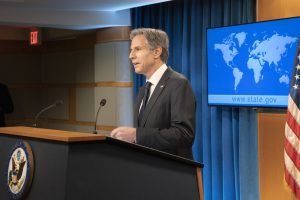Incoming U.S. Secretary of State Antony Blinken has wasted no time in reaching out American allies in Southeast Asia, holding calls with his Philippine and Thai counterparts the day after his confirmation by the U.S. Senate.
In his talks with the two officials, Blinken said that the United States rejects China’s maritime claims in the South China Sea beyond what it is permitted under international law and stands with Southeast Asian claimants “in the face of PRC pressure.”
According to the official State Department read-out from his call with Philippine Foreign Secretary Teodoro Tocsin, Blinken said that the U.S. “rejects China’s maritime claims in the South China Sea to the extent they exceed the maritime zones that China is permitted to claim under international law as reflected in the 1982 Law of the Sea Convention.”
Of more direct importance to the Philippines, he also “stressed the importance of the Mutual Defense Treaty for the security of both nations, and its clear application to armed attacks against the Philippine armed forces, public vessels, or aircraft in the Pacific, which includes the South China Sea.”
This pertains to a long-time concern in Manila about whether the 1951 Mutual Defense Treaty (MDT) – the basis for the two nations’ long-standing alliance – extends to features in the South China Sea that the Philippines officially claimed in the years after the treaty’s signing. This question sharpened following the perceived U.S. inaction during the Philippines’s 2012 stand-off with China over Scarborough Shoal, a ring of coral reefs around 200 kilometers due west of Luzon Island.
While Secretary of State Mike Pompeo clarified in 2019 that the MDT applied to Philippine-claimed features and forces in the South China Sea, whether Biden’s team would reaffirm the commitment was likely one of the main questions that Manila had about the incoming administration.
The official read-out of Blinken’s call with Foreign Minister Don Pramudwinai was more terse. It stated only that Blinken and “reaffirmed the strength of the United States-Thailand defense alliance, reviewed global efforts to combat the COVID-19 pandemic, and discussed the importance of working together to advance our shared prosperity, security, and values across the free and open Indo-Pacific region.”
In some ways, this early outreach represents low-hanging diplomatic fruit for the Biden administration, and are largely consistent with Blinken’s pre-election promise that a President Biden would “show up and engage ASEAN on critical issues.” As I wrote shortly after the U.S. election in November, there is likely to be a more even, cohesive tenor from the Biden administration, which will likely also make the effort of fronting up for important ASEAN meetings, unlike Trump’s team. More broadly, the MDT commitment further demonstrates the administration’s willingness to maintain elements of Trump administration policy that it views as useful or beneficial, rather than rejecting it tout court. (Also notable was Blinken’s and the State Department’s use of the phrase “Indo-Pacific.”)
Thailand and the Philippines are both obvious priorities for the new administration, given the fact that they are both treaty allies with which Washington has had strained relations in recent years. In the Philippines’ case, much of that has stemmed from President Rodrigo Duterte’s brand of violent law-and-order populism and his spurning of his relationship with the U.S. in favor of more robust ties with China.
The problems in the Thai-U.S. relationship are less acute and personalized, but in some ways more intractable. Since the end of the Cold War, the two nations’ sense of shared interest and purpose – based in shared resistance to communist expansion first from China, then from Vietnam – has dissipated as Thailand has thickened its economic and political ties with China. Meanwhile, Thailand’s relations with the U.S. have been tested by American criticisms of the military coups and spasms of repression that have accompanied its perpetual political crisis, including the government’s ongoing crackdown against a simmering youth-led pro-democracy movement.
However, few of the problems in the alliances had little specifically to do with Trump. If anything, Trump’s transactional style and near-total indifference to human rights actually helped shore up relations with Bangkok and Manila. As I’ve argued previously, Biden’s administration is likely to face many of the same challenges and tensions that the past two administrations have faced.
One is the thorny question of how much the U.S. is willing to risk to deter Chinese actions in the South China Sea, and whether more assertive military operations in the region would provoke anxieties in the region. Another is how the administration manages to square its desire to rebuild relationships with regional partners with its stated goal of placing democracy promotion and human rights back at the center of American foreign policy. In the cases of both Thailand and the Philippines, recent tensions have been at least partly stemmed from the undemocratic actions of the nations’ leaders, and their intolerance of American criticisms along these lines.
There is little to suggest that either side has changed its view on these questions, which suggests a degree of friction will persist in Washington’s relationships with its treaty allies in Southeast Asia. One should be wary of reading too much into tweets, but it was perhaps telling that while Blinken’s tweet about his call with Thailand’s foreign minister mentioned the two nations’ “shared values,” Don’s corresponding post did not.

































